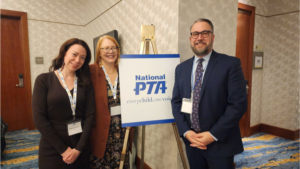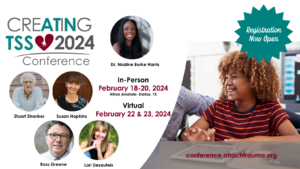We are thrilled to welcome Allison Cooke Douglas to the ATN blog team. Allison is not only an adoptive and former foster mom, she is also a foster parent trainer and leader. She currently serves as a DCS Foster Parent Education Specialist for Centerstone in Tennessee. As her opening post, we are sharing her remarks as she edited and updated them in honor of NATA Day.
by: Allison Cooke Douglas
 I originally gave these remarks at the ASAP Conference in early June. Several details have been edited to maintain some privacy of children I have fostered and adopted.
I originally gave these remarks at the ASAP Conference in early June. Several details have been edited to maintain some privacy of children I have fostered and adopted.
Thank you so much for having me today. In 2006 my husband and I became foster parents. Our plan was foster for 10 years and to work so diligently with birth families that all the kids who came through our home would return to happy, whole birth parents. But I’m here at an adoption conference, so you can guess what came of that plans…
Our very first placement was a beautiful little girl, whose case manager told us not to enroll her in Kindergarten because she’d be home before school started. She’s now 14- just finished 8th grade and is home…back in Knoxville with my husband and other kids. After several months we also became the foster parents of her younger brother and over the next few years we fostered and then adopted our first placement, her little brother and 2 other children. We have a 14 year old daughter, 10 and 7 year old sons and 3 year old daughter. My oldest boy has consistently struggled; coping with the effects of drug and alcohol exposure and major trauma, all occurring before his second birthday.
As a foster and adoptive parent, I FELT prepared. I had the education, but not the practical knowledge that I needed. I knew about survival behaviors, but had no idea what it would feel like to live with survival behaviors. A fellow adoptive parent said it beautifully and hilariously, “It’s one thing to know a child has an impulse control issue, it’s a whole ‘nother thing to have a stapler whizzing by your head.” Even though I had completed the required classes offered by the Department of Children’s Services, I just didn’t have the depth of knowledge that I needed. I parented a very tough kid for 4 years before I even heard the term therapeutic parenting.
Seeking out services for my son was frustrating; it felt like practitioners who really understood the effects of trauma and substance exposure or the needs of adopted children were hidden and rare. Helpful therapists or mental health case managers would come along for several months and then move to different agency or a new position. It took me a few years to realize the folks working with these vulnerable and sometimes shockingly traumatized kids were often grad students completing supervision hours and that crisis worker and case manager are typically entry level positions. About 2 weeks ago, my son was in a therapy appointment; he was deeply mourning the loss of his birth mom and the therapist asked him to list the people who loved him and supported him. He listed me and my husband, grandparents and cousins and friends, and then moved on to his favorite therapist (who moved), and then the 6 case managers he’d been through in the last two years. I’m glad he had a long list, but for a child dealing with chaos and loss he saw in his most formative years, he should have had a short list of folks who were in it for the long haul, because healing for him and so many other kids like him, is a long, long haul.
We HAVE found some great services and providers. Harmony’s ASAP program was helpful in firming up attachment with my son soon after his adoption. We had an amazing therapist for several years who just blew my mind with her understanding of kids with preverbal trauma (later, as my own education expanded, I found she was trained by Dr. Charles Zeanah, who has done great academic and practical work in the field of infant mental health and attachment).
These services were really helpful for my son and our family. But not all the services we utilized were family centered. In order for adoption services to support children, the entire family unit HAS TO BE included. Parenting traumatized children is traumatizing. It affects everyone living in the home and as parents and professionals, we have to acknowledge and address that reality. I recently spoke on a panel about an experience I had caring for a kid who acted out sexually; and one of audience members asked me a question I had never been asked about parenting traumatized children; never in all of my 7 years of interactions with “adoption professionals” had anyone asked me about this. His question was, “How are you doing?” That stopped me in my tracks, I started crying, because the answer was far too large to address in a 20 minute panel. The truth is: Trauma isn’t contained within the hurt child; it spills over — sometimes in tiny drops but sometimes like an erupting volcano that covers every part of the life you share with this child.
Adoption in many cases isn’t Pinterest parenting. It’s not about chevron striping and adorable pictures with chalk boards. It’s not typically Facebook parenting. The pictures aren’t always ones we want to share with friends and family. Adoption can be ugly, gritty parenting. It is about digging deep, getting dirty, getting messy in the trauma and the hurt and then… in healing. Our kids can heal, they do so often do heal, everyone here has the privilege of being part of that. My role has expanded from being a foster and adoptive parent to now training the required courses all foster parents must take to become certified in Tennessee. My job and your job too, is supporting children (and in turn their families) on the long path to successful adoptions.
My son was having a tough time with me leaving yesterday. He was fussing, making repetitive noises and pushing my suitcase off the couch; just generally being dysregulated and he asked me why I needed to come to Nashville. I told him I was working, just like I do at home, but I would be at a conference for 2 nights instead of just the evening. He asked me who would be at the conference and I told him there would be therapists and case workers and people who worked with families like ours and he said, “What in the world do you need to say to them for 2 days?”
What I need to say is don’t give up on kids like Charlie and moms like me. We need you. We need better, deeper education; we need providers who are committed to understanding the specialized needs of adopted kids- who get trauma and attachment, the science of brain development and who understand the effects of prenatal substance abuse and know how to put all that knowledge into family centered practice. We need to work together for Charlie and all of the Charlies that we serve.


